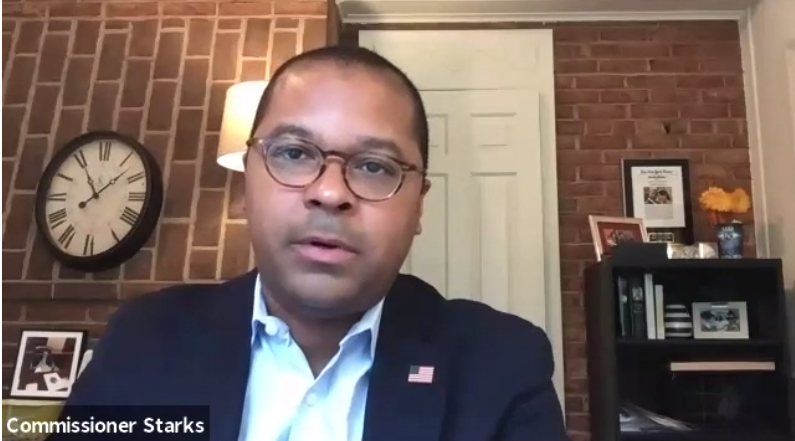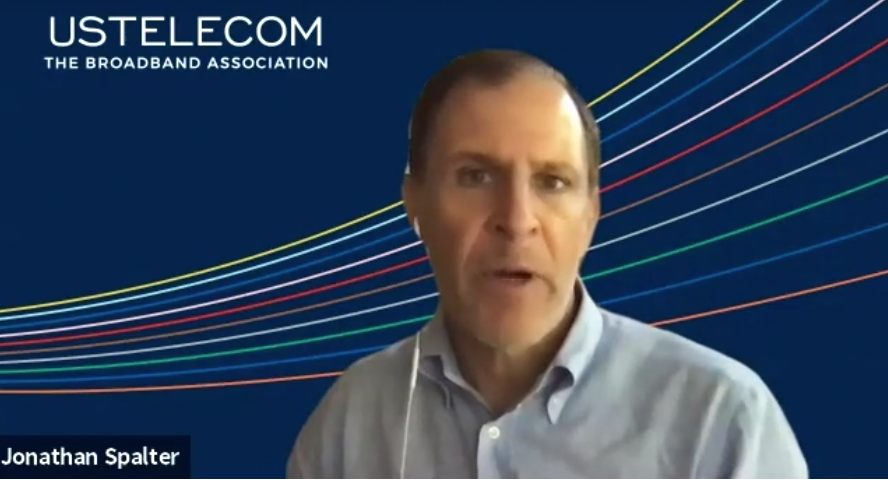FCC's Starks: Newly Unemployed Need Affordable Broadband Option
The smarter way to stay on top of the multichannel video marketplace. Sign up below.
You are now subscribed
Your newsletter sign-up was successful
"There is a moral component to the fact that we have so many Americans that are still getting left behind," says FCC commissioner Geoffrey Starks of the digital divide.

Starks was speaking on "The Role of Connectivity in Digital Equity and Inclusion" in a USTelecom webinar hosted by the association's president, Jonathan Spalter.
Starks said there was definitely inequity in the ability to access transformative technology. Spalter said he "absolutely agreed."
Related: Starks Says Policymakers Must Be More Inclusive
Spalter said he had been e-mailing with Larry Irving, former head of the National Telecommunications & Information Administration and widely credited with coining the term "digital divide," who pointed out that internet inequality includes many seniors, particularly in the current COVID-19 pandemic (given that they are at the greatest risk of dying of the virus).
Starks' uses the term "internet inequality" rather than "digital divide." Spalter asked why that better reflected the current problem. He said that beyond the issue of access was the issue of affordability.
The commissioner said there are millions of Americans who simply can't afford the internet and that while the rural digital divide is very important, the lack of connectivity in certain urban areas was a problem he was increasingly fixated on.
The smarter way to stay on top of the multichannel video marketplace. Sign up below.
As to seniors, Starks said there is a "relevance" issue. He pointed out that many had lived most of their lives without the Internet and didn't really see the relevance, but that that perspective has been changing as more and more seniors have become physically isolated.

But Starks said the issue of internet inequality can be summed up this way: "It is past time for us to make sure that all Americans are connected, and the pandemic has really made clear the disparate impact that is has for folks who have and who have not.
Universal service was one way to address the problem, Spalter said. He asked whether those programs--Lifeline, E-Rate--were up to the task or needed to be rethought. Starks said it is tough to stand up brand new programs so, as a pragmatic approach it makes sense to rely on the current programs, but not as currently constituted.
"E-rate has got to do more," he said, "to meet the moment." Lifeline was a critical piece, he said of the low-income broadband subsidy program, but it needs higher speeds and larger bandwidth requirements.
Beyond that, the FCC should strike memorandums of understanding with subsidy-qualifying programs, like SNAP and Medicaid, so the program is better able to reach Americans that are struggling, he said.
And for the 40 million recently unemployed, the government needs to get them an affordable option of a $10, $11 or $12 per month broadband connection.
Starks gave ISPs credit for signing on to the FCC's voluntary Keeping America Connected pledge, which expired June 30, and said he knew ISPs could not continue to float nonpaying customers indefinitely, which is why Congress would need to step in to fund broadband aid.
He said people should not have to choose between paying for food or for broadband connectivity, "so Congress is going to have to address that issue," including putting broadband bucks into any future COVID-19 aid legislation.
Spalter said that Black Lives Matter has shed a needed light on the divisions and pain in the country and sparked a needed conversation about racial justice. He noted that Starks has said connectivity helps bend the arc toward justice and asked him to elaborate on "where we go from here."
Starks said he believed that the country was in the midst not just of a moment, but of a movement. He said there is "no one way to be Black in America" and that each Black person has a unique and personal story about what that has meant.
But he said there is a shared experience and common thread, which called a bond that has been tightened over the past few weeks because of a lot of shared emotions of fear and frustration over a long time. But he also said there was shared hope.
Starks said there are vectors that will have to change over a long-time horizon, which was Dr. Martin Luther King's point about the arc of the universe being long, but bending toward justice. He said housing, education, and public health are all focused on right now, but that internet inequality must be a focus also because when you are talking about education and economic opportunity any the eventual re-opening of the economy, people will not be going back to a physical location to find jobs. They will be applying online. Digital connectivity will be essential for the millions who will need to re-engage with the workforce.
Broadband access is a civil right that we can't afford not to have, but that many can't afford to have, he said, and that has to change.
Contributing editor John Eggerton has been an editor and/or writer on media regulation, legislation and policy for over four decades, including covering the FCC, FTC, Congress, the major media trade associations, and the federal courts. In addition to Multichannel News and Broadcasting + Cable, his work has appeared in Radio World, TV Technology, TV Fax, This Week in Consumer Electronics, Variety and the Encyclopedia Britannica.

